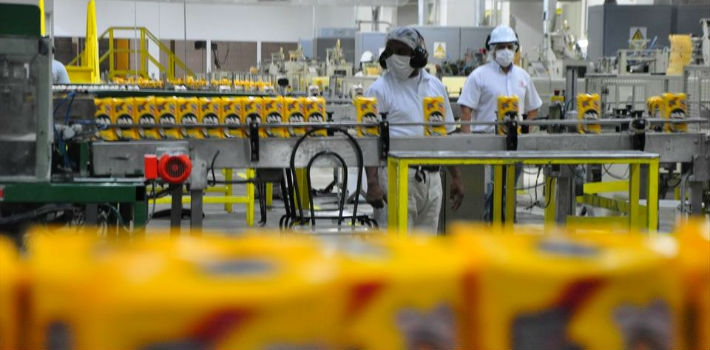
EspañolScarcely a week after the arrest of the owners of Venezuelan pharmaceutical chain Farmatodo and the managing director of supermarket firm Día a Día, the government of President Nicolás Maduro has now turned on domestic industry giant Polar. Ten trucks carrying company merchandize were seized on February 7, and much of their contents redirected to the state distributor to help combat rampant shortages in the South American country.
Economic Warfare
Polar is Venezuela’s biggest industrial corporation, with operations stretching back 70 years. It makes foodstuffs, carbonated and alcoholic drinks, snacks, sauces, spreads, ice creams, and detergents, with annual sales of around US$3 billion. After state oil firm PDVSA, Polar is considered the country’s second largest enterprise.
On February 5, the Gaceta Oficial published the new regulated sale price for precooked maize flour, Polar’s most-sold product, increasing it to 19 Bs. (US$0.10 at the market rate). The same article also prohibited the manufacture and sale of flours improved by or mixed with yellow maize flours, so that the primary material continues to be traditional white flour, despite its desperate scarcity.
Once the new cost of the flour was published, Polar Foods director Manuel Felipe Larrazábal described the state increase as “insufficient” and requested an immediate meeting with the national government.
Larrazábal emphasized that the government had authorized an increase of 218 percent for the product’s prime material, but in the case of maize flour the increase was only 53 percent. He argued that the fair price for precooked flour should be 26.50 Bs. ($0.14) and that the misalignment of prices was losing Empresas Polar some 683 million Bs. per year.
On the black market, P.A.N. flour (the base used for the arepa, the principal national foodstuff) is worth around 40 Bs. ($0.21) per kilogram.
The Polar manager reiterated that the company represents 49 percent of the country’s total national production of precooked maize flour, vital in Venezuelan cooking. He explained to the executive that the prohibition on mixing flours wouldn’t increase the total volume of flour available on the market, instead only diminishing the options available to consumers.
El 30% de nuestra producción se fabricaba en mezcla de harinas. A partir de hoy, debemos asumir la pérdida de todos los materiales.
— Empresas Polar (@EmpresasPolar) February 5, 2015
“Thirty percent of our production is with mixed flour. Now we have to take on the loss of all these materials.”
After Empresas Polar’s complaint, Larrazábal met with Vice President of Food Security and Sovereignty Carlos Osorio, who promised to review his plans and give an answer as soon as possible.
The Seizures Continue
But on Saturday, February 7, after a meeting between Polar representatives and the Venezuelan government, the company complained of Bolivarian National Guard (GNB) redirecting 10 of its food trucks in Barinas State, in the south-central portion of the country.
GNB y Gobernación de Barinas desviaron camiones y dispusieron ilegalmente de productos de Alimentos Polar http://t.co/qufDerA14n
— Empresas Polar (@EmpresasPolar) February 7, 2015
“GNB and Barinas government divert trucks and illegally expropriate Polar Foods products.”
The officials who headed the seizure of the vehicles have confirmed that they did so on the orders of the state government. They initially freed four trucks, while the six remaining were rerouted towards a state distribution center (Disbasa).
Carla Hernández, Polar’s legal representative, told press that the authorities had indicated that the merchandize in the trucks would remain the property of the state distributor, a measure which she described as “completely illegal.”
She detailed that both the drivers and their vehicles had the required documentation, and met with all regulations to transport foodstuffs. Among the retained products were precooked maize, rice, pasta, washing powder, soap, and other cleaning products.
On the same Saturday evening, the company said through its official Twitter account that five of the remaining six trucks had been released, with one remaining in the hands of the GNB and Disbasa. On Tuesday, February 10, three days later, the company announced the release of the remaining vehicle.
Todos los camiones de Alimentos Polar retenidos ilegalmente han sido liberados. Seguimos produciendo y distribuyendo alimentos.
— Empresas Polar (@EmpresasPolar) February 10, 2015
“All the illegally seized Polar Foods trucks have been freed. We continue to produce and distribute foodstuffs.”
Venezuelan authorities have yet to state the reason for the seizure.
In the Revolution’s Crosshairs
However, government moves against the chain aren’t a complete surprise. Former President Hugo Chávez frequently referred to Polar and its owners, among them Lorenzo Mendoza, with insults and thinly-veiled threats, suggesting the firm could be expropriated.
In 2012, the government ordered the immediate occupation of 105 territories across the country for the construction of houses, on some of which Empresas Polares depots happened to be located.
Chávez ordered the seizure of several Polar warehouses centered in Barquisimeto, Lara State capital, including locales that formed part of the Pepsi Cola distribution chain, to build social housing.
Empresas Polar then described the move as “arbitrary, unnecessary, and unjust,” and asked the Supreme Court to annul the measure. The company alleged that the land in question formed part of a “strictly industrial and commercial zone,” where residential buildings were forbidden.

On Sunday, February 8, local media reported that group of motorcyclists beat up a Polar worker, Pedro Márquez, blaming him for shortages.
Upon leaving his house, one of the group identified Márquez by his company-issue shirt. According to Márquez, he denied the accusations but was soon surrounded, thrown to the ground, and kicked in the neck and chest.
Spoiling for a Fight
In December 2014, Polar Foods revealed in a report that the company was investigated on nine separate occasions in the period between September 8 and 21 alone. It further stated that government entities visited stores and warehouses 24 times per month on average across the year.
When Maduro accused Polar of having deliberately incurred shortages, he ordered another judicial investigation. After inspectors reviewed several plants, the company published on its Twitter account that it had proved to the Venezuelan government that it was working at 100 percent of its capacity.
Después de 72 horas de inspección en nuestras plantas, seguimos demostrando a la Sundde que producimos a plena capacidad.
— Empresas Polar (@EmpresasPolar) December 6, 2014
“After 72 hours of inspections in our factories, we continue to demonstrate that we’re producing at full capacity.”
Translated by Laurie Blair. Edited by Guillermo Jimenez.
 Versión Español
Versión Español












